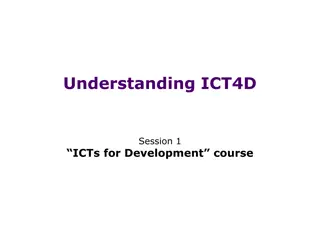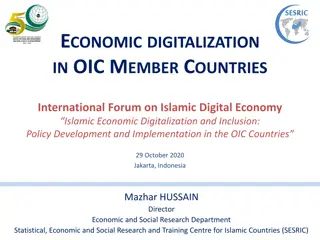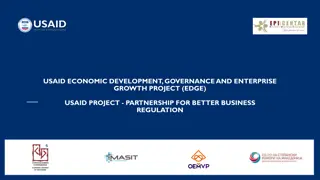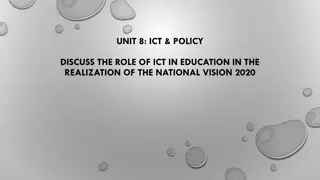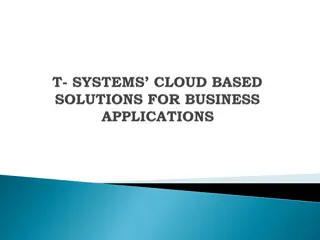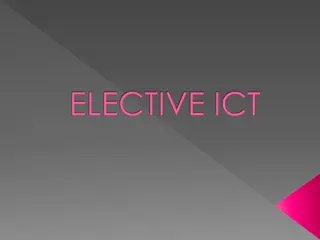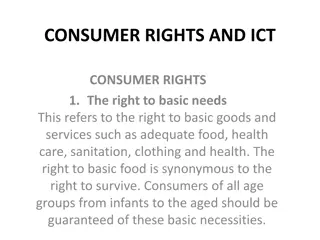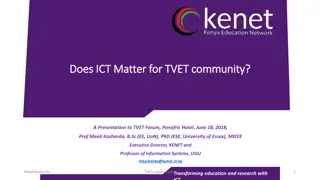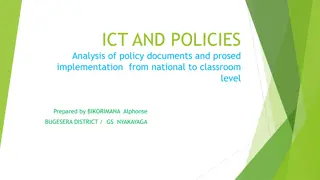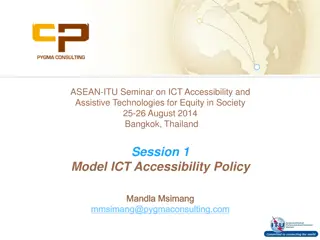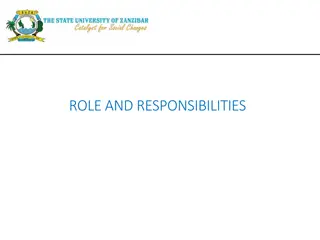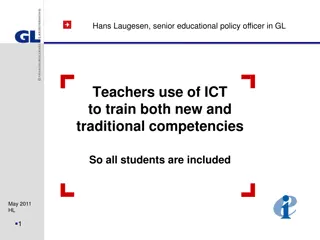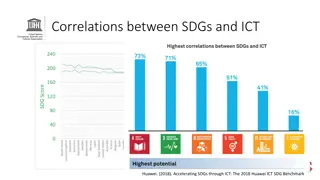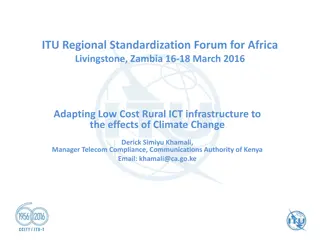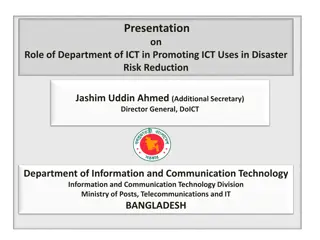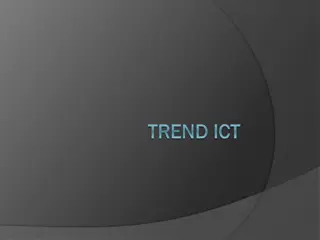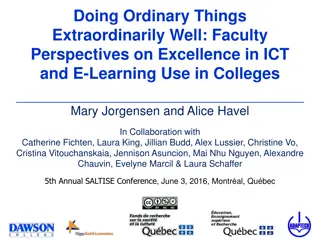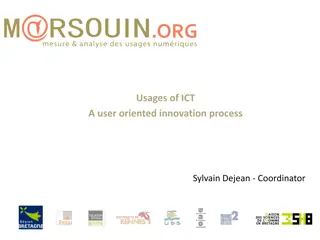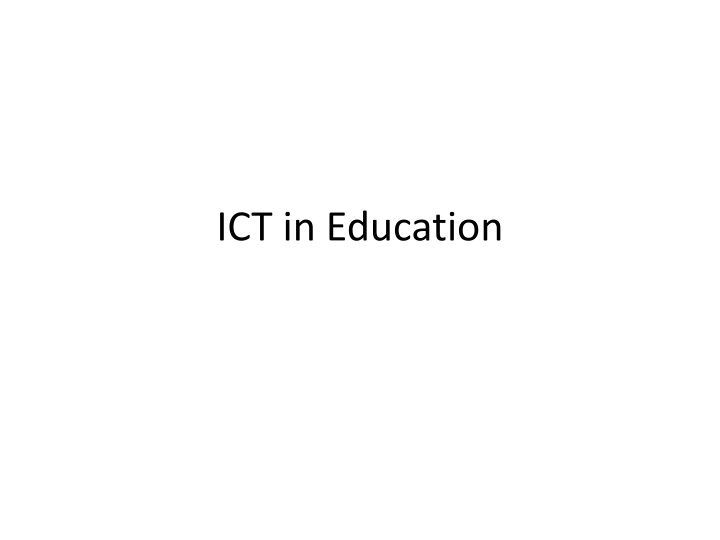
Utilizing ICT in Education: Advantages, Disadvantages, and Impact
Explore the benefits and drawbacks of using Information and Communication Technologies (ICT) in education, from enhancing student learning to challenges in implementation. Learn how ICT tools are transforming teaching methods and shaping the future of education. Discover the significance of e-learning and the role of modern technologies in educational institutions. Understand the impact of ICT on various aspects of human life, from social interaction to academic progress. Stay informed about the evolving landscape of technology-assisted learning in today's educational settings.
Download Presentation

Please find below an Image/Link to download the presentation.
The content on the website is provided AS IS for your information and personal use only. It may not be sold, licensed, or shared on other websites without obtaining consent from the author. If you encounter any issues during the download, it is possible that the publisher has removed the file from their server.
You are allowed to download the files provided on this website for personal or commercial use, subject to the condition that they are used lawfully. All files are the property of their respective owners.
The content on the website is provided AS IS for your information and personal use only. It may not be sold, licensed, or shared on other websites without obtaining consent from the author.
E N D
Presentation Transcript
ICT in Education "ICT"is the Information and Communication Technologies. "ICT in Education" means "Teaching and Learning with ICT".
ICT in Education Main advantages of ICT tools for education 1 Through ICT, images can easily be used in teaching and improving the retentive memory of students. 2 Through ICT, teachers can easily explain complex instructions and ensure students' comprehension. 3 Through ICT, teachers are able to create interactive classes and make the lessons more enjoyable, which could improve student attendance and concentration.
ICT in Education Main disadvantages of ICT tools for education 1 Setting up the devices can be very troublesome. 2 Too expensive to afford 3 Hard for teachers to use with a lack of experience using ICT tools
ICT in Education In educational institutions (e.g., schools, high schools, universities.) and in work life, the question of how to utilize modern information and communication technologies for learning purposes is important. Altarawneh, 2011). Technology-assisted learning tools is quickly changing the face of education, transitioning the classroom only learning environment to an online only or blended online learning experience.
ICT in Education We have experienced how individuals, societies, even countries are benefit with the use of ICT in all aspects of the human life i.e socially, academically and others. This is also supported by Karsenti, et al (2012) who argued, we must be concerned about ICT in education because it is clear that ICT will continue to significantly impact all societies worldwide, in all economic, social, and cultural domains.
ICT in Education The use of ICT in teaching and learning is called e-learning. Zhang et al (2004) defined e-learning as technology-based learning in which learning materials are delivered electronically to remote learners via a computer network
E-learning definitions Elliott Masie The use of technology to design, deliver, select, administer, support and extend learning Percepsys Using a technological means (Internet/Intranet/Extranet) to access and manage learning that supports and enhances the knowledge of an individual
Benefit of E-learning ICT supports the facilitation process by providing infrastructure and material learner-centered and self-paced, time and location flexibility, cost-effective for learners, unlimited access to knowledge and archival capability Technologies such as computer, internet, e-mail, mobile phones and others are used in flexible learning systems for delivery of courses, facilitation of access to resources, enhancing of interactions with students, and provision of feedback and support to students
Benefit of E-learning ICT encourage communication and collaboration in science research activity, and in primary science education enable students to collect science information, interact with resource such as image, video and encourage communication and collaboration Research shows that ICT in education can support delivery and access, student understanding knowledge creation and as a goal, enable students acquire the technical skills that they will be able to use in the workplace (Kozma R 2005).
Challenges of E-learning (According to different scholars Insufficient prioritization of ICT in the implementation of educational and development policies Inadequate infrastructure in regard to electricity, telecommunication especially in rural and remote areas Insufficient numbers of qualified technical personnel to manage and maintain ICT resources Inadequate training and capacity resulting in underutilization of ICT facilities
Challenges of E-learning (According to different scholars Widespread view of ICT as a status symbol rather than a tool Lack of awareness of the multifaceted range of ICTs and how they can be used to address existing challenges Hierarchical and territorial organizational structures and cultures, and resistance to change Insufficient financial resources to ensure the equitable and sustainable integration of ICT in education and at all levels
Challenges of E-learning Lack of time (ICT integration is not prioritized in teaching practice, where the workload is already very heavy); Hardware issues (lack of hardware, difficulty of access, obsolescence, defects, lack of adequate peripheral devices such as printers and scanners, too-slow or non-functioning Internet connections, etc.); Technical difficulties (technical problems encountered when using technologies); Absence or lack of technical support for ICT integration Absence or lack of administrative support by the educational institution;
Challenges of E-learning Class management problems that limit the potential for techno pedagogical innovations in the classroom; Group size (too many students in the class for effective ICT integration) Organizational constraints and barriers within the education system; Absence or lack of relevant pedagogical materials
E-learning tools Radio, Television LMS eg MOODLE, BLACKBOARD Dropbox Google drive/Google docs/plus OER You tube MOOCs External LMS (Coursera, Udacity, Khan Academy, Edx) Wikipedia Recording tools eg Screencast O-Matic, a tube catcher Others
E-learning Organization The evolution of e-learning in lower/higher education has gone through three major periods: the Traditional Institution; The Blended Institution; and Online Institution.
What is Moodle Modular Object-Orientated Dynamic Learning Environment Open Source under GNU Public Licence. It is a learning management system that is designed to help instructors create an online classroom setting with opportunities for rich interaction and collaboration Moodle can be used to supplement on ground courses or can be used to host completely online courses.
Features Site Management User Management Course Management Assignment Module Chat Module Quiz Modules Forum Module Resources (webpages, documents etc..) Activites (assignment submission, wikis, discussion board, journals, blogs etc..) Many other custom modules created by Moodle users.
OER Open educational resources (OER) are freely accessible, openly licensed documents and media that are useful for teaching, learning, and assessing as well as for research purposes MOOCs (Coursera, Khanacademy, ..etc) You tube Wikipedia E-book Other sources
List of OER S/N Website Themes, Discipline 1. http://www.scoop.it 2. https://www.oercommons.org 3. http://www.jorum.ac.uk 4. http://www.temoa.info 5. http://xpert.nottingham.ac.uk 6. http://edtechpost.wikispaces.com/OER+Dynamic+Search+Engine 7. http://www.jiscdigitalmedia.ac.uk/guide/finding-video-audio-and- images-online/#creative-commons 8. https://open4us.org/find-oer/ 9. http://oerconsortium.org/discipline-specific/ 10. https://jisc.ac.uk/guides/open-educational-resources 11. http://ocw.mit.edu/index.htm 12. http://languagebox.ac.uk/ 13. http://humbox.ac.uk/
Questions Q & A


